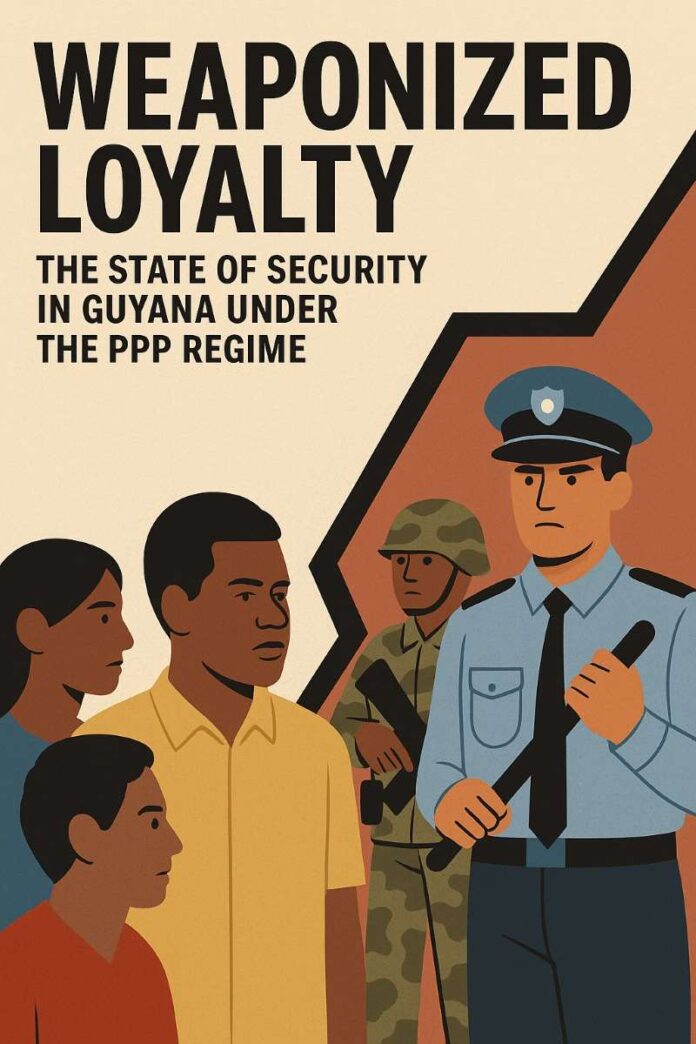In Guyana, a troubling transformation has taken root in the intersection of politics and public security. Over the past few decades, under the rule of the People’s Progressive Party (PPP), security institutions traditionally seen as neutral protectors of law and order have increasingly become instruments of political control. The consequences have rippled across society, fracturing public trust, undermining law enforcement credibility, and fueling fears of state-enabled vigilantism.
A Disarmed Public and a Weaponized State
One of the most alarming developments has been the strategic disarmament of the civilian population. According to numerous accounts, access to firearm permits is tightly controlled, and approval is seemingly contingent on political loyalty. Business owners, even those with clear justifications for self-defense, have reported either being denied permits or revoked if perceived as opposing the ruling party.
This systematic denial has left many, particularly those outside of PPP patronage, vulnerable to banditry and other violent crimes. In some instances, rogue elements within law enforcement, or alleged death squads under the auspices of the PPP Party, posing as opposition figures or Afro-Guyanese civilians, have committed extrajudicial killings and acts of intimidation, deepening racial and political divisions.
Sheriff Security: A Private Force With Public Power?
Amid this precarious landscape, one private security firm has risen to unexpected prominence: Sheriff Security Group. Ostensibly a private entity, it operates with the appearance and in some cases, the authority of a state-backed force. Headed by individuals including Ameir Ahmad with associates Shareef Ahmad and Ed Ahmad (a former convicted felon in the United States), the firm has taken on a role in public law enforcement that raises critical questions about accountability and oversight.
Reports suggest that Sheriff Security personnel are routinely involved in official operations, often with senior PPP officials’ tacit or explicit backing. This has led many to conclude that the state has effectively outsourced elements of the country’s security apparatus to a politically connected private firm, bypassing the usual democratic safeguards.
Who Guards the Guardians?
Even more concerning is the composition of Sheriff Security’s workforce. Some employees allegedly have checkered pasts with law enforcement in Guyana and the United States. In contrast, others are former officers pushed out of public service and drawn to the private sector due to limited economic options. This blurring of lines between former state agents and private security contractors, operating with weapons and quasi-legal powers, creates a volatile dynamic.
Furthermore, the firm’s apparent impunity and growing influence may contribute to a dual-tier justice system, one for those aligned with power and another for the marginalized majority.
The Price of Political Dissent
Guyana’s economic framework increasingly reflects its political structure. Contracts, licenses, and jobs flow through loyalty networks rather than merit. Those who do not conform to PPP expectations reportedly face professional ostracism and financial hardship. Many are forced to choose between complicity and survival in such an environment.
This economic marginalization, paired with a state-favored private security force and a disarmed populace, creates conditions ripe for authoritarian drift. The chilling message is clear: dissent will be punished, and protection is conditional.
A Nation at a Crossroads
Guyana now stands at a crucial juncture. Without serious reform and demilitarization of politics, the continued erosion of democratic norms and public trust may prove irreversible. Security must once again serve the people, not the party. Firearm policies, law enforcement independence, and the regulation of private security actors all require urgent scrutiny.
If left unaddressed, the current trajectory threatens to transform Guyana from a fragile democracy into a state where fear, not law, governs.






